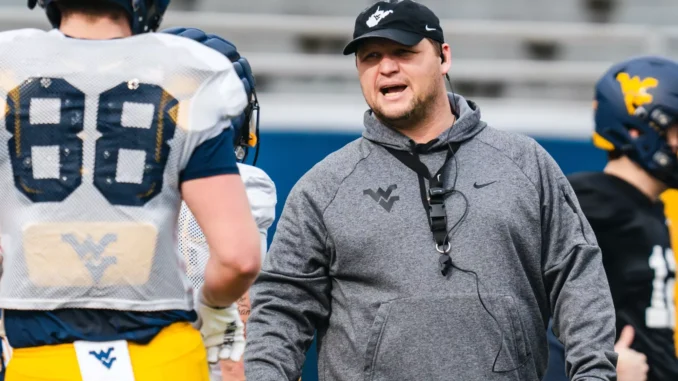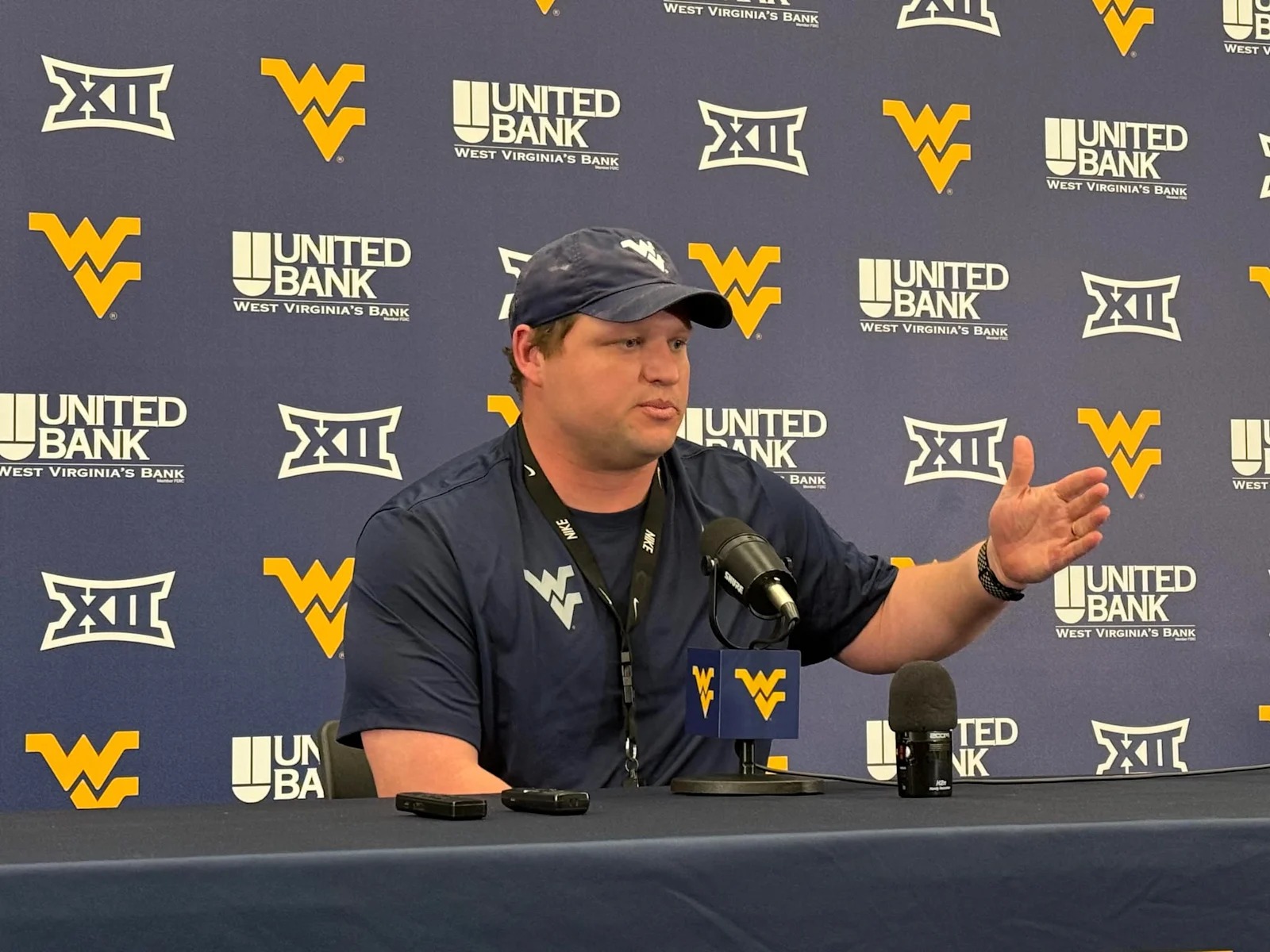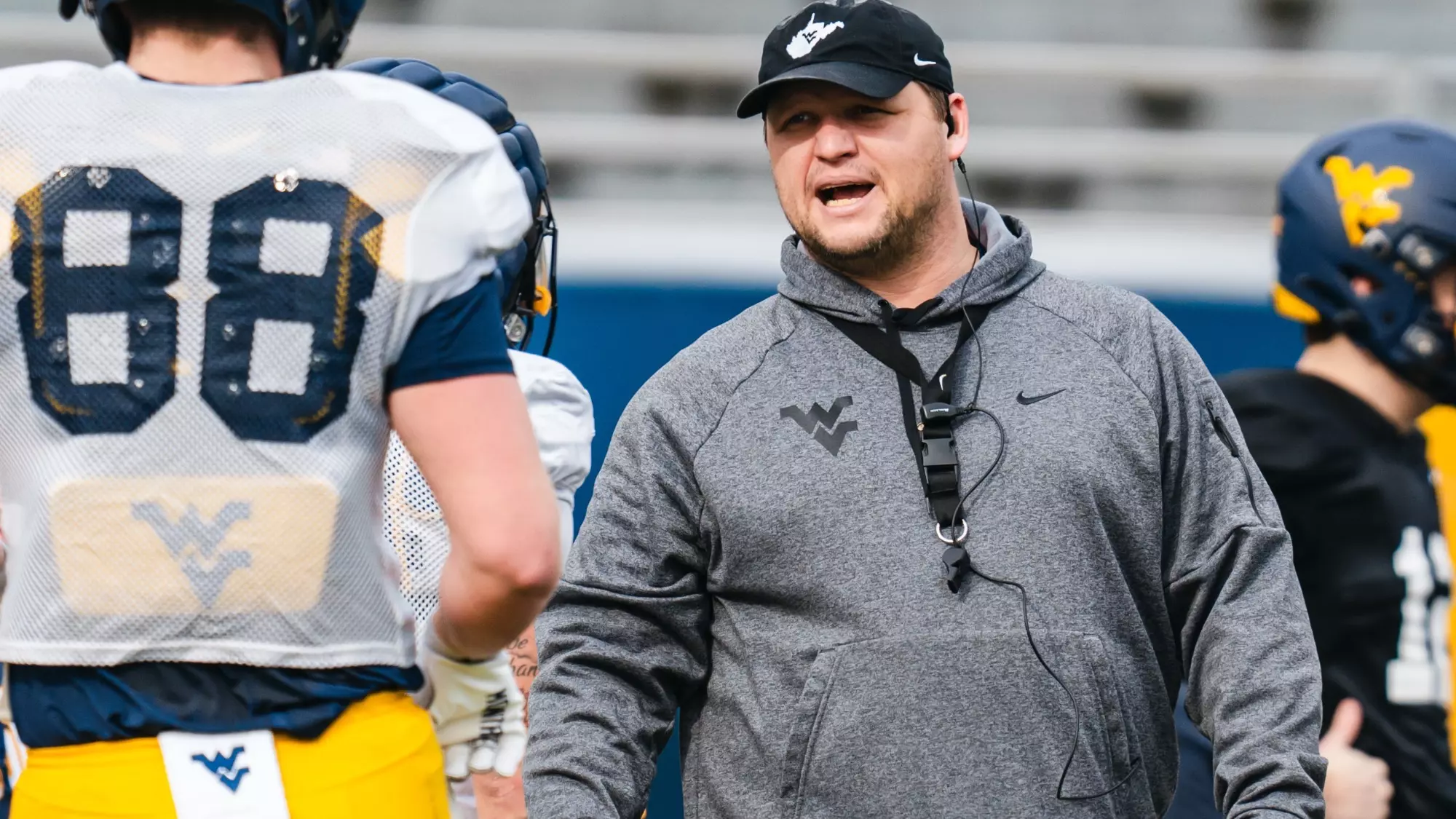
ESPN REPORT: West Virginia Mountaineers Football Tight Ends Coach and Special Teams Coordinator Michael Nysewander Rejects $27 Million Offer from Pittsburgh Panthers
In a stunning development that has reverberated throughout the college football landscape, Michael Nysewander, the Tight Ends Coach and Special Teams Coordinator for the West Virginia Mountaineers, has turned down a staggering $27 million offer from the Pittsburgh Panthers. This bold decision underscores Nysewander’s unwavering commitment to the Mountaineers and highlights the profound impact he has had on the program.
Background on Michael Nysewander
Michael Nysewander’s tenure with the West Virginia Mountaineers has been marked by significant contributions to the team’s success. As the Tight Ends Coach, Nysewander has played a pivotal role in developing some of the program’s most talented players, enhancing their skills and readiness for professional football. Additionally, his role as Special Teams Coordinator has added a layer of strategic depth to the Mountaineers’ gameplay, making them a formidable opponent in the Big 12 Conference.

Nysewander’s journey in college football is a testament to his dedication and expertise. Before joining the Mountaineers, he honed his coaching skills through various roles in different programs, building a reputation as a skilled tactician and player developer. His ability to connect with players and foster a culture of excellence has been particularly noteworthy.
The Offer from Pittsburgh Panthers
The $27 million offer from the Pittsburgh Panthers is one of the most lucrative deals ever extended to an assistant coach in college football. This figure not only reflects Nysewander’s value as a coach but also the Panthers’ determination to revamp their program with top-tier talent. The offer reportedly included a significant salary, performance bonuses, and possibly even a stake in program revenue. Despite the financial allure, Nysewander chose to stay with the Mountaineers, a decision that speaks volumes about his priorities and loyalty.
Reasons Behind Nysewander’s Decision
Several factors likely influenced Nysewander’s decision to turn down the Panthers’ offer:
Program Culture: The culture and camaraderie within the West Virginia Mountaineers program might have played a crucial role. Nysewander could have developed strong relationships with the players, coaching staff, and administrative team, making it hard for the Panthers to match the intangible benefits he enjoys at West Virginia.
Success and Growth: The potential for continued success and growth within the Mountaineers’ program might have been more appealing to Nysewander than the financial gain. With his contributions, the team could be on the cusp of achieving significant milestones, and Nysewander might not want to miss out on being part of that journey.

Loyalty and Commitment: Nysewander’s decision could also stem from a sense of loyalty and commitment to West Virginia. After investing considerable time and effort into building a strong football program, he might prefer to see his initiatives through to fruition rather than starting anew.
Competitive Edge: Staying at West Virginia allows Nysewander to maintain and enhance the competitive edge he has helped develop. The familiarity with the team’s strengths and weaknesses gives him a unique advantage in shaping the players and strategies for upcoming seasons.
Implications for College Football
Nysewander’s decision has several implications for the landscape of college football:
Program Loyalty: This move highlights the importance of loyalty and long-term commitment in college sports. It shows that success is not solely about financial gain but also about building and sustaining a program’s culture and ethos.
Market Value: The $27 million offer sets a new benchmark for assistant coaches in college football. It reflects the growing recognition of the importance of specialized coaching roles and the willingness of programs to invest heavily in top talent.
Recruitment and Retention: For West Virginia, retaining Nysewander strengthens their coaching staff and sends a positive message to current and prospective players about the program’s stability and commitment to its staff. For the Pittsburgh Panthers, this setback might prompt a reevaluation of their recruitment strategies and offers for coaching positions.
Reactions from the College Football Community
The news of Nysewander turning down the lucrative offer has elicited a range of reactions from coaches, players, and sports analysts. Many have praised Nysewander’s loyalty and commitment to West Virginia, emphasizing that his presence is invaluable to the program’s continued success. Others have pointed out the financial implications, noting that the figure offered by the Panthers could potentially fund several scholarships or facility upgrades.
Conclusion
Michael Nysewander’s decision to stay with the West Virginia Mountaineers despite the $27 million offer from the Pittsburgh Panthers is a landmark moment in college football. It underscores the multifaceted nature of success in sports, where financial incentives are just one of many factors at play. As the college football world continues to evolve, Nysewander’s choice serves as a powerful reminder of the importance of loyalty, program culture, and the pursuit of excellence. The Mountaineers’ fan base will undoubtedly welcome Nysewander’s continued leadership, anticipating the exciting developments his commitment promises to bring to the program.
Future Prospects
With Nysewander at the helm of the tight ends and special teams, the West Virginia Mountaineers are poised for continued success. The program’s ability to attract and retain top coaching talent like Nysewander will be crucial in maintaining its competitive edge in the Big 12 Conference. As the landscape of college football continues to shift, the Mountaineers’ commitment to their staff and players will remain a cornerstone of their strategy for success.
In the end, Nysewander’s decision is a testament to the power of loyalty and commitment in achieving greatness. As the Mountaineers look to the future, they do so with one of the most talented and dedicated coaching staffs in college football, ready to take on the challenges of the season and beyond.

ESPN REPORT: West Virginia Mountaineers Football Tight Ends Coach and Special Teams Coordinator Michael Nysewander Rejects $27 Million Offer from Pittsburgh Panthers In a stunning development that has reverberated throughout the college football landscape, Michael Nysewander, the Tight Ends Coach and Special Teams Coordinator for the West Virginia Mountaineers, has turned down a staggering $27 million offer from the Pittsburgh Panthers. This bold decision underscores Nysewander’s unwavering commitment to the Mountaineers and highlights the profound impact he has had on the program. Background on Michael Nysewander Michael Nysewander’s tenure with the West Virginia Mountaineers has been marked by significant contributions to the team’s success. As the Tight Ends Coach, Nysewander has played a pivotal role in developing some of the program’s most talented players, enhancing their skills and readiness for professional football. Additionally, his role as Special Teams Coordinator has added a layer of strategic depth to the Mountaineers’ gameplay, making them a formidable opponent in the Big 12 Conference. Nysewander’s journey in college football is a testament to his dedication and expertise. Before joining the Mountaineers, he honed his coaching skills through various roles in different programs, building a reputation as a skilled tactician and player developer. His ability to connect with players and foster a culture of excellence has been particularly noteworthy. The Offer from Pittsburgh Panthers The $27 million offer from the Pittsburgh Panthers is one of the most lucrative deals ever extended to an assistant coach in college football. This figure not only reflects Nysewander’s value as a coach but also the Panthers’ determination to revamp their program with top-tier talent. The offer reportedly included a significant salary, performance bonuses, and possibly even a stake in program revenue. Despite the financial allure, Nysewander chose to stay with the Mountaineers, a decision that speaks volumes about his priorities and loyalty. Reasons Behind Nysewander’s Decision Several factors likely influenced Nysewander’s decision to turn down the Panthers’ offer: Program Culture: The culture and camaraderie within the West Virginia Mountaineers program might have played a crucial role. Nysewander could have developed strong relationships with the players, coaching staff, and administrative team, making it hard for the Panthers to match the intangible benefits he enjoys at West Virginia. Success and Growth: The potential for continued success and growth within the Mountaineers’ program might have been more appealing to Nysewander than the financial gain.

With his contributions, the team could be on the cusp of achieving significant milestones, and Nysewander might not want to miss out on being part of that journey. Loyalty and Commitment: Nysewander’s decision could also stem from a sense of loyalty and commitment to West Virginia. After investing considerable time and effort into building a strong football program, he might prefer to see his initiatives through to fruition rather than starting anew. Competitive Edge: Staying at West Virginia allows Nysewander to maintain and enhance the competitive edge he has helped develop. The familiarity with the team’s strengths and weaknesses gives him a unique advantage in shaping the players and strategies for upcoming seasons. Implications for College Football Nysewander’s decision has several implications for the landscape of college football: Program Loyalty: This move highlights the importance of loyalty and long-term commitment in college sports. It shows that success is not solely about financial gain but also about building and sustaining a program’s culture and ethos. Market Value: The $27 million offer sets a new benchmark for assistant coaches in college football. It reflects the growing recognition of the importance of specialized coaching roles and the willingness of programs to invest heavily in top talent. Recruitment and Retention: For West Virginia, retaining Nysewander strengthens their coaching staff and sends a positive message to current and prospective players about the program’s stability and commitment to its staff. For the Pittsburgh Panthers, this setback might prompt a reevaluation of their recruitment strategies and offers for coaching positions. Reactions from the College Football Community The news of Nysewander turning down the lucrative offer has elicited a range of reactions from coaches, players, and sports analysts. Many have praised Nysewander’s loyalty and commitment to West Virginia, emphasizing that his presence is invaluable to the program’s continued success. Others have pointed out the financial implications, noting that the figure offered by the Panthers could potentially fund several scholarships or facility upgrades. Conclusion Michael Nysewander’s decision to stay with the West Virginia Mountaineers despite the $27 million offer from the Pittsburgh Panthers is a landmark moment in college football. It underscores the multifaceted nature of success in sports, where financial incentives are just one of many factors at play. As the college football world continues to evolve, Nysewander’s choice serves as a powerful reminder of the importance of loyalty, program culture, and the pursuit of excellence. The Mountaineers’ fan base will undoubtedly welcome Nysewander’s continued leadership, anticipating the exciting developments his commitment promises to bring to the program. Future Prospects With Nysewander at the helm of the tight ends and special teams, the West Virginia Mountaineers are poised for continued success. The program’s ability to attract and retain top coaching talent like Nysewander will be crucial in maintaining its competitive edge in the Big 12 Conference. As the landscape of college football continues to shift, the Mountaineers’ commitment to their staff and players will remain a cornerstone of their strategy for success. In the end, Nysewander’s decision is a testament to the power of loyalty and commitment in achieving greatness. As the Mountaineers look to the future, they do so with one of the most talented and dedicated coaching staffs in college football, ready to take on the challenges of the season and beyond.
Leave a Reply